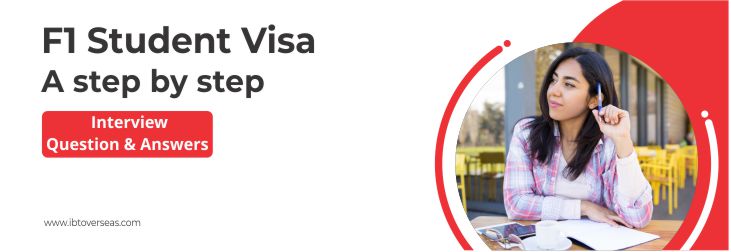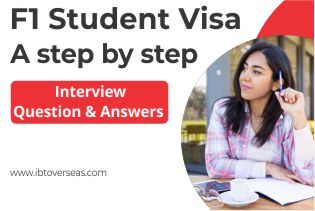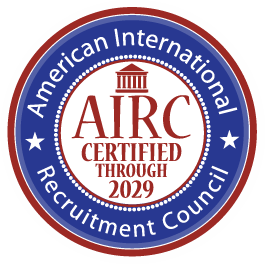Most Asked F1 Visa Interview Question & Answers
Students who aim to study in the USA are often seen worried about their visa interview. Well, there is nothing to bother about. A few questions are asked of the students in the F1 visa interview. Some students assume that the interviewer intends to reject their visa by asking some complicated questions. This is a rumor and not at all the truth. Only general questions are asked in the interview for verification purposes. If you prepare them well, you will definitely get your visa.
Well, what are those questions? How can you answer them? This blog covers some commonly asked questions in the F1 visa interview and the right way to answer them. We hope this blog will help you tackle every question confidently in order to get your USA study visa in minimal time.
Here are some frequently asked questions in an F1 visa interview:
1. Why did you choose this particular study program?
You need to search thoroughly about the study program you have chosen and the apt reason for how this study program can help you achieve your goals.
"Hii Manbir Singh Here founder & CEO of IBT Overseas, Holds 10+ years of immigration experience. We are an emerging team of student visa consultants sucessfully stamped 1000+ Visa. Moreover, IBT Overseas recently bagged the “Best in the market” award in the immigration field by the leading national media."
2. Why did you choose this particular university?
To answer this question, research well about the university you have chosen and mark some important features and positive points of that university such as rankings, the experience of the faculty and so on. Show your excitement to study at that university by elaborating on its features and benefits.
3. Where did you complete your previous education?
Here, you have to mention your qualification and the institute from which you have completed it. If the university is highly recognized, make sure to mention that as well.
4. What is your father’s/mother’s occupation?
This question is asked to know whether your parents can provide you with enough financial support or not. Well, it does not mean that you will give answers with dishonesty. You have to be honest and provide the right information. Otherwise, it can impact your visa.
5. Why don’t you do this course in your home country?
Here, you have to compare the education provided in your home country with that provided in the USA in that particular course. You can give a reason for the quality of education in the USA, the practical approach followed to teach students and innovative teaching methodologies to keep your point clear.
This question is related to finance. Here, you can talk about scholarships if you have taken them or mention your sponsors such as your father and mother who are responsible for managing your finances.
7. How many brothers or sisters do you have?
You have to give your personal answer here. Make sure to give a crisp and to-the-point answer.
If you have not got any loan, you can simply say no. Otherwise, you have to speak about the loan you have applied to. After that, the interviewer can ask you ‘how will you repay the loan?’. Here, you can say that after completing your higher education in the USA, you can get a lucrative job opportunity in your home country which will help you repay your study loan. However, don’t mention the part-time job in the USA as it can lower your chances of getting the visa.
9. Do you have relatives in the USA?
Some students talk about distant relatives who live in the USA. Well, you just have to say about your immediate relatives such as your mother, father or siblings. Be honest while answering this question because the authorities have a full record of your family.
10. What will you do after completing your study program in the USA?
Never say that you intend to settle in the USA after completing your study program. Instead, you can say that after completing your higher education in the USA, you will get ample job opportunities in your home country. Therefore, you will come back and develop your career in your country and live with your family happily.
Here, you have to know about your bank details and say that you have saved a sufficient amount of money to manage your fees and living cost while studying in the USA.
12. What are the positive things about studying in the USA?
Here, you can justify the merits of studying in the USA such as the quality of education, experienced trainers, result-oriented approach to teaching, and so on.
13. What are your plans if your study visa gets rejected?
Never say that you will study in your home country after refusal. Instead, you can say that I will re-apply to the USA again because attaining an education in the USA is the only way to develop my career in my country.
14. Are you able to speak and understand English?
To answer this question, you can mention your scores in the language proficiency test such as IELTS, PTE or TOEFL. You can mention your scores in the individual modules such as listening, speaking, reading and writing.
15. Will you prefer to work while studying in the USA?
An interviewer can ask this question to know whether you will say yes or no. This way, he/she will predict whether you are ready to earn while studying because of financial issues or not. So, you can say that my complete focus will be on my studies. However, if I will get a chance to work on campus, I will surely take this opportunity.
16. Where is your university located?
The interviewer can ask this question to know whether the university is chosen by you or your consultant. So, you need to be aware of the location of your university, research well, check the address and answer concisely.
17. What is the cost of your university per year?
Check the tuition fee of the university and give an exact answer. You can also give an estimate but it must be approximate. For example, if the tuition fee is $25,000 and if you answer $10,000-$15,000 it would be totally wrong. Here, you can say $22,000-$25,000, it would be right.
18. Can you afford to study in the USA?
Here, you have to talk about your financial capability. Make sure to give a personal answer here rather than copying anyone or memorizing the answer.
19. Will you come back to your home country during vacations?
Many people say that they will not come back to their home country during vacations and will prefer to work full time in the USA to earn money. This is entirely wrong. This shows that a student is not financially strong. Hence, the examiner can predict that you will not come back to your country after completing education. So, you can say that ‘I will prepare for my exams during vacations instead of coming to my country’.
20. What are the names of the universities you have applied for?
Here, you have to tell how many universities you applied for and their names as well.

Looking for USA Visa ?
Conclusion
To conclude, repairing all these questions perfectly will help you answer everything confidently. If you seek the right training to prepare well for the F1 interview, you can contact the best platform such as IBT overseas.











